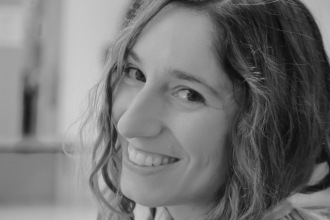There are hundreds of plants and flowers native to northeast Ohio, and I think each one must be covered in thorns.
My mother leads me, my husband, and our four-year old through the grasses; she knows this place better than we do, but it changes between her visits and there are few markers to guide us. We’ve already taken one wrong turn, wandered down the wrong path until the slope grew too steep, too shaded by trees taller and older than what we’re looking for.
I’ve told my daughter we’ve come to visit a special stone with her grandfather’s name on it. I didn’t say ‘grave.’
My father’s ashes are buried on the hillside of a sprawling nature preserve, a spot unrecognizable as a cemetery. There are no arched headstones, no groundskeeper mowing circles around the graves, and no cut flowers. There is only wild, green growth. The grass is tamped down along narrow paths where other footsteps have passed, but we can see across the hills and valley, and for now, we’re alone.
I haven’t been back since the burial, when the spot we’re looking for was at the center of a large clearing. But the landscape has shifted since then, and nothing, nothing is recognizable. The world has grown up around this patch of earth where we marked his life, covered it with wild, shifting plants and flowers. Now, we’re wading through an overgrown meadow thick with raspberry bushes and prairie grass, parting thorny stalks that pierce my fingers no matter how carefully I try to grip only the tip of a leaf. Around us, the air is alive with the hum of bees and tiny insects. Weeds and wildflowers reach past my knees, sometimes taller than my daughter, and my husband guides her away from the thorns. Every few feet, we stop so she can watch the butterflies flitting around the flowers, their long tongues dipped into the center of an aster.
She’s old enough now to ask questions about him, the grandfather who disappeared from the world while she grew inside me, readying herself for it, cells in bloom.
When she was an infant, I dreamed of seeing the two of them together, as if everything were normal. But then, he’d ask me her name or how old she was, and I’d go silent, stunned I’d never told him these simple, essential facts. For whole, long seconds after I woke, I would not be able to grasp the reason they’d never met.
Back then, I thought I had plenty of time before she’d ask about him. I believed it would be easier now, but when she wants to know why he died, my throat closes around any possible explanation, and no answer will ever feel sufficient.
<>
My mother and I comb through the wilds while my husband holds my daughter above the thorns. Each time we think we’ve found the spot, we step around and over the plants, pulling vines to the side, the thorns catching our skin. I’m unprepared for this landscape; it’s summer and my calves and arms are exposed, now covered in almost imperceptible scratches, pinprick droplets of blood rising to the surface. A line of stems catches my back and snags three thorns through my shirt and into the skin. I hold still while my mother pinches the tip of the stem between two fingers and pulls. One at a time, the thorns break away from my skin and the fabric of my shirt, and we keep searching. We search for so long the trip feels like more of a quest, one we might not complete.
<>
I tried to explain this place to my daughter before coming, that it was special place to remember her grandfather. But when we first arrived, she looked out the window for a moment and then told me, “I still can’t remember him.”
She had expected a memory, some impossible memory, to appear in her mind when we got here, and it felt like I’d already failed her.
Finally, my mother finds a stand of wild bergamot, waist-high purple blossoms reaching into the air, and knows we’re close. I nudge the raspberry brambles around them in different directions, and then a bit of sunlight falls on the ground and across a piece of stone. Only a corner is exposed, but I know it. Brick-red, a flat rock lying nearly even with the earth. It’s been swallowed by a tangle of plants and grasses growing live and wild around it. My husband finds his way back to us and steps into the thorny vines, pressing them into the ground until there’s the smallest clearing and we can see part of his name, carved into rock. Enough to show this spot of earth to our daughter.
For days, I’ve steeled myself, knowing I’d be here with her. I don’t want her to see me upset, because I don’t want her to stop asking about him. I need these moments, when I can still bring him into her life in some small, insufficient way.
We tell her his name, pointing out the letters etched in stone and for a just few minutes, she sees something of him.
I want to stay longer, but there’s nowhere to sit in this tangle of shrubs and vines. But we’re here, she’s seen it, and I’ve stayed calm. It’s enough, and it isn’t.
We step out of the thorns to leave this place, this strange and overgrown place that looks nothing like a cemetery but seems to understand something of grief – how massive and wild, but so often invisible it is in the face of the living world. It is a kind of reassurance, to return years later to a part of the earth that makes you wade and dig and claw your way through tangles and knots of vines before finding what you’re looking for. Even the thorns catching your skin with every step are a reassurance, a response to a question you hadn’t spoken aloud.
Yes, they tell you. Yes, it is still supposed to hurt.

Kara Oakleaf’s work has appeared in SmokeLong Quarterly, Wigleaf, Jellyfish Review, Monkeybicycle, Nimrod, Stirring, Tahoma Literary Review, and elsewhere. Her fiction has been listed in the Wigleaf Top 50, as a finalist for Best Small Fictions, and appears in the Bloomsbury anthology Short-Form Creative Writing. She received her M.F.A. from George Mason University, where she now teaches and directs the Fall for the Book literary festival. Find her online at karaoakleaf.com.


